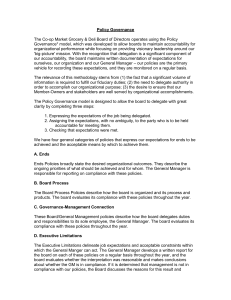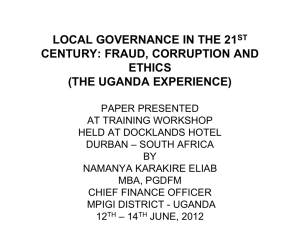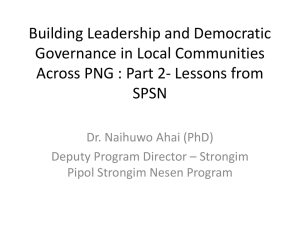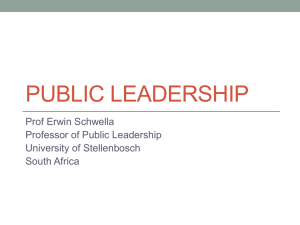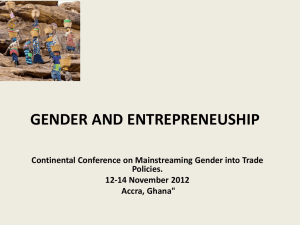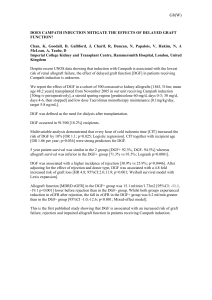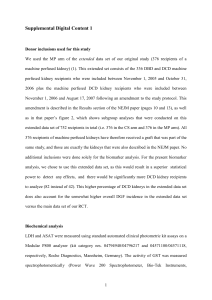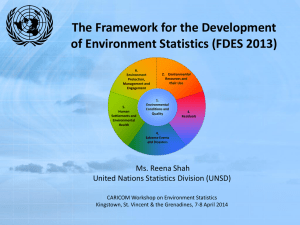Programme Information Sheet * Democratic
advertisement
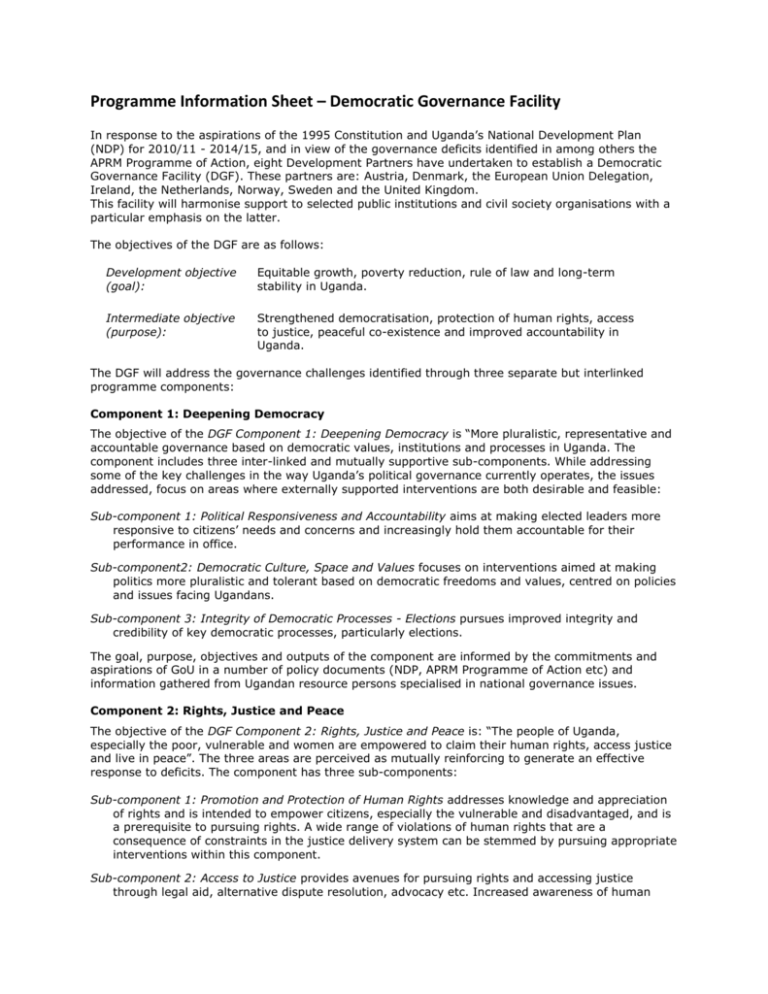
Programme Information Sheet – Democratic Governance Facility In response to the aspirations of the 1995 Constitution and Uganda’s National Development Plan (NDP) for 2010/11 - 2014/15, and in view of the governance deficits identified in among others the APRM Programme of Action, eight Development Partners have undertaken to establish a Democratic Governance Facility (DGF). These partners are: Austria, Denmark, the European Union Delegation, Ireland, the Netherlands, Norway, Sweden and the United Kingdom. This facility will harmonise support to selected public institutions and civil society organisations with a particular emphasis on the latter. The objectives of the DGF are as follows: Development objective (goal): Equitable growth, poverty reduction, rule of law and long-term stability in Uganda. Intermediate objective (purpose): Strengthened democratisation, protection of human rights, access to justice, peaceful co-existence and improved accountability in Uganda. The DGF will address the governance challenges identified through three separate but interlinked programme components: Component 1: Deepening Democracy The objective of the DGF Component 1: Deepening Democracy is “More pluralistic, representative and accountable governance based on democratic values, institutions and processes in Uganda. The component includes three inter-linked and mutually supportive sub-components. While addressing some of the key challenges in the way Uganda’s political governance currently operates, the issues addressed, focus on areas where externally supported interventions are both desirable and feasible: Sub-component 1: Political Responsiveness and Accountability aims at making elected leaders more responsive to citizens’ needs and concerns and increasingly hold them accountable for their performance in office. Sub-component2: Democratic Culture, Space and Values focuses on interventions aimed at making politics more pluralistic and tolerant based on democratic freedoms and values, centred on policies and issues facing Ugandans. Sub-component 3: Integrity of Democratic Processes - Elections pursues improved integrity and credibility of key democratic processes, particularly elections. The goal, purpose, objectives and outputs of the component are informed by the commitments and aspirations of GoU in a number of policy documents (NDP, APRM Programme of Action etc) and information gathered from Ugandan resource persons specialised in national governance issues. Component 2: Rights, Justice and Peace The objective of the DGF Component 2: Rights, Justice and Peace is: “The people of Uganda, especially the poor, vulnerable and women are empowered to claim their human rights, access justice and live in peace”. The three areas are perceived as mutually reinforcing to generate an effective response to deficits. The component has three sub-components: Sub-component 1: Promotion and Protection of Human Rights addresses knowledge and appreciation of rights and is intended to empower citizens, especially the vulnerable and disadvantaged, and is a prerequisite to pursuing rights. A wide range of violations of human rights that are a consequence of constraints in the justice delivery system can be stemmed by pursuing appropriate interventions within this component. Sub-component 2: Access to Justice provides avenues for pursuing rights and accessing justice through legal aid, alternative dispute resolution, advocacy etc. Increased awareness of human rights going hand in hand with improved access to legal aid services should ultimately result in improved access to justice and protection of human rights. Furthermore, the pursuit and realisation of justice for the poor and vulnerable is empowering and increases confidence and belief in the claim of rights as well as the justice delivery mechanisms available. Sub-component 3: Peace and Reconciliation pursues rights and access to justice aimed at underpinning the process for transitional justice since peace cannot be achieved without justice and justice is not achievable without peace. Both are needed to overcome poverty, increase confidence in the rule of law, and to promote economic growth. Component 3: Voice and Accountability The objective of the DGF Component 3: Voice and Accountability is: “Strengthened accountability and transparency of service providers at state and local government level”. The component focuses on the promotion and protection of economic, social and cultural rights through strengthening of voice and accountability, which in essence are about how citizens articulate their needs and concerns and subsequently hold the state to account for fulfilling the roles that are entrusted to it by society. The component is comprised of three sub-components: Sub-component 1: Local Accountability Networks and Partnerships is formulated around the support to and creation of Local Accountability Networks and Partnerships. This includes both existing networks or individual organisations that will be engaged in demanding and advocating for change and improvements at the local and sub-national levels. Sub-component 2: Improved Basic Service Delivery to Poor, Vulnerable and Socially Excluded Groups in Northern Uganda and other Areas with Poor and Excluded Groups aims at improving the delivery of basic services, but with a particular focus upon Northern Uganda. Using the GoU’s own Peace, Recovery and Development Programme (PRDP) as a starting point, the sub-component intends to geographically target vulnerable groups in areas of extreme poverty – in this case Karamoja and Acholi Districts – in a specific effort to focus upon holding service providers in some of the poorest areas of Uganda, accountable to citizens. Sub-component 3: Harnessing Natural Resources for Better Service Delivery tackles the issue of accountability in the extraction of natural resources, and will be focused on oil governance issues at the start-up of the DGF. This will deal with accountability issues; translating oil incomes into better services, better quality of life and better economic opportunities. Also it will deal with issues around community conflicts, land ownership and understanding of rights, obligations and responsibilities. A human rights based approach will facilitate the mainstreaming of cross-cutting issues into the DGF, among them gender mainstreaming and others. The Democratic Governance Facility will operate from 1 July 2011 to 31 December 2016, during which time programme partners will be selected and proposals will be considered.
